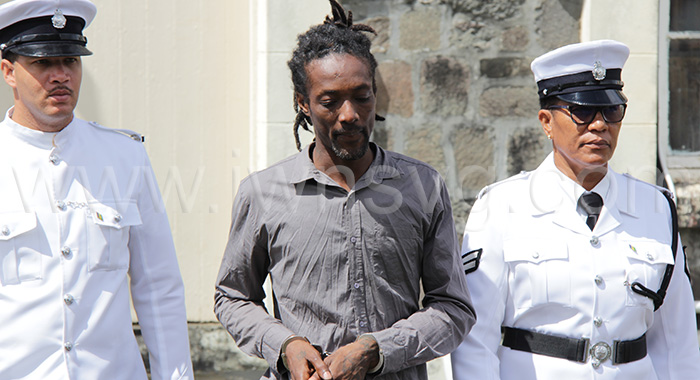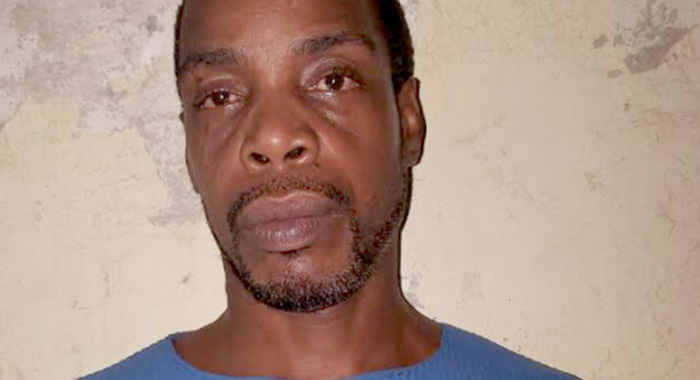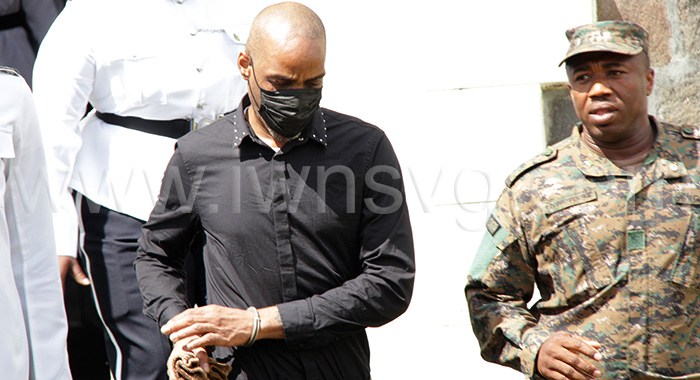A man who forced his badly beaten victim, hand and foot bound, to kneel before chopping him to death has been jailed for life, while his co-accused, whose testimony helped to secure a murder conviction, will spend a further seven years in prison.
Justice Bryan Cottle handed down the life sentence on Kamara Lampkin, 43, of Cane Garden, at High Court No. 1, in Kingstown, on Friday.
It was the second life sentence the judge handed down this month.
And, as he did in the case of Junior Jarvis, Justice Cottle ruled that Lampkin be brought back before the court after 30 years to see if he is sufficiently rehabilitated to be released.
If he is not rehabilitated — and in the absence of parole legislation — Lampkin, like Jarvis, would be reviewed every three years.
His accomplice, Phil Dover, 27, of Layou, was sentenced to 12 years in prison, one third of the full amount he would have had to serve had it not been for his guilty plea and evidence against Lampkin.
At Friday’s sentencing hearing, Lampkin was represented by counsel Charmaine Walters, who was holding for Israel Bruce.
The lawyer told the court that the defence was relying on the submissions that Bruce had made on behalf of his client.
However, Lampkin told the court he wanted to say something, and went on to apologise to the court and the family of his victim, Carson Warner, 27, of Questelles, “for what happened to Carson not because of me.
“I was there, so I have to tell them sorry,” Lampkin said, before his lawyer told him to say no more.
Lampkin was convicted after a full trial on the indictment that had charged him and Dover with Warner’s murder.
However, Dover pleaded guilty to manslaughter and testified for the prosecution against Lampkin.
The facts, as outlined by the judge, are that on Aug. 24, 2018, a Friday, Warner, Dover, Lampkin and Dwayne Walker, then 40, of Layou, were at Campden Park, drinking together.

They visited several bars before going to Walker’s home, in Layou, where they continued to drink.
There, a disagreement broke out and Lampkin and Dover set upon Warner and beat him badly.
They bound his arms and legs and wrapped him, bleeding, in a sheet and took him to Layou Hole and chopped him about the body and tossed him onto the rocky foreshore below.
Dover said he saw Lampkin chop Warner and denied that he inflicted any. Lampkin made the same claim against Dover.
Warner died of his injuries and a forensic pathologist identified 19 such wounds.
Dover testified that as Lampkin began to chop Warner, he (Dover) drove the car away to avoid blood splattering onto the vehicle.
He then returned and took Lampkin to Walker’s home where he showered.
Police launched an investigation and Dover was arrested the following day. He made a detailed admission to the police, setting out his part in the killing.
Walker, along with Rawle Bowens, a 25-year-old mechanic of Lower Questelles, were also charged with murder in connection with Warner’s death.
However, as the preliminary inquiry began at the Serious Offences Court in February 2019, the prosecution withdrew the charge against Walker and Bowens, who had spent six months in prison awaiting the preliminary hearing.
‘influenced by bad company’
At the High Court, the prosecution accepted Dover’s guilty plea for manslaughter and he also agreed to and testified against Lampkin, who maintained his innocence.
The judge said that Dover is the father of several children and his education ended at the primary school level.
However, he attended the Campden Park Technical Institute, where he was trained in carpentry.
Residents of his community described him as quiet with no history of violence.
People were surprised that he was involved in the killing and said he allowed himself to be influenced by bad company and that they would be happy to welcome him back into the community after he serves his prison term.
Dover’s family expressed similar sentiments.
The judge noted that Dover expressed sincere remorse and had asked for Warner’s family’s forgiveness.
‘radical’ and ‘arrogant’
Meanwhile, Lampkin is the father of three children, aged 13 to 18 and continued to deny culpability but expressed apology in court for the part he played in the killing, the judge said.
Lampkin left school at senior 3 and worked as a labourer. His parents said he is a good boy and asked the court to show leniency.
However, members of his community who were willing to be interviewed had nothing positive to say about him, describing him as “radical” and “arrogant”.
They asked the court not to ease up on him, the judge said, adding that it was telling that some people told the social worker they had nothing to say about Lampkin.
Justice Cottle noted the classical aims of criminal punishment, namely retribution, deterrence, prevention, and rehabilitation.
In sentencing Dover, the judge pointed out that manslaughter carries a maximum sentence of life imprisonment and noted that the prosecution had suggested that his crime was level B or high.
However, the judge disagreed and placed it at level A, or very high, because of the combination of several factors in the sentencing guidelines.
Justice Cottle noted that Warner’s death was caused in the course of unlawful action that involved intention to cause harm.
He said it was an act that carried high risk of serious harm which was obvious or ought to have been obvious to Dover.
Warner’s body was concealed by having been thrown over an embankment with the intention of having it fall into the sea.

The judge established a starting sentence of 24 years in prison, saying that he had disagreed that it should be six years, as Dover’s lawyer had suggested.
The aggravating features of the case include the fact that one witness to the assault described the men as repeatedly stomping on Warner as he lay on the ground.
He was gargling and struggling to breathe, the judge said, adding that his hands and feet were then bound and he was dragged away to the site of the execution.
This caused significant physical and mental suffering, Justice Cottle said, adding that Dover’s role was significant though lesser.
He said there was no premeditation, noting that the victim and his attackers had been drinking at bars and at Walker’s before things took a turn for the worse.
The judge found no aggravating features of Dover and said mitigating on his behalf was his genuine remorse and his co-operation with police.
The judge noted that Dover pleaded guilty, thereby accepting responsibility and demonstrated that his remorse is genuine by assisting the prosecution.
He said that offenders who assist the prosecution in such a way merit a discount at a level that shows it is worthwhile to assist the Crown in such a way.
One-third discount for assisting prosecution
The judge said that in the United Kingdom, such discounts amount to one-third of the sentence.
The court moved the sentence up three years to take account of the aggravating feature of the offence and applied the one-third discount to the 27-year sentence.
From the 18 years sentence, the court applied a further one-third discount for Dover’s guilty plea.
The four years, six month and 16 days that Dover spent on remand was deducted from the 12-year sentence, leaving a sentence of seven years, five months and 14 days from Friday.
The judge said the issue of parole did not arise because there is no parole legislation in the country.
In sentencing Lampkin, the judge noted that the maximum sentence for murder is death.
He pointed out that the prosecution had rightly not sought the death penalty as the killing did not rank as among the worst of the worst to merit that.
The judge noted that Warner was abducted and taken from Walker’s home to Layou Hole where he was killed.
Before his death, he endured prolonged suffering at the hand of the offenders.
Justice Cottle further said that in determining where to impose a whole life sentence, the court also considered whether Lampkin is likely to commit further offences of serious violence and whether he is a substantial danger to the community.
The judge noted that Warner was chopped 19 times as he was forced to kneel before Lampkin.
Some of the chops were such that his skull was penetrated and his brain exposed.
This convinced the court that Lampkin can be characterised as a danger to the society, Justice Cottle said and selected a starting sentence of life imprisonment.
He said that had he not done so, he would have started at 30 years because the sentencing guidelines say that where an offender takes a bladed weapon to the scene of a crime with intent to use it to commit murder and commits murder, this is sufficiently serious to have a starting point of 30 years.
Aggravating of the offence was the fact that the murder was unprovoked.
The judge said there were suggestions from Dover that Warner had uttered words that upset them and caused them to initiate the attack.
However, the Court did not think the provocation was so high as to provoke the killing.
The judge said that Warner was then tied up and chopped to death and it is clear that he suffered before his demise.
Other witnesses threatened
He said that other people who were present at Walker’s home were threatened so that Lampkin could facilitate the commission of the offence.
Lampkin played a leading role, the court said, and noted that he left St. Vincent illegally in an attempt to avoid being charged.
In October 2019, Lampkin was deported from Grenada where he was facing drug trafficking and immigration charges, to face the murder charge in St. Vincent.
The judge said that Lampkin had no previous conviction, the only mitigating feature of the offender.

The court found the mitigating features outweighed the aggravating and the judge said that had he started with a 30-year sentence, he would have moved it up by four years.
Lampkin had spent three years, four months and 23 days on remand and that would have been deducted from the sentence and the court would have arrived at a final sentence of 30 years seven month and seven days.
On the issue of parole, the judge said that in the absence of the parole act, it would appear that any offender sentenced to a life sentence should literally spend the rest of his life behind bars.
“That strikes me as wrong in principle,” Justice Cottle said, adding that he maintains that convicted persons maintain their humanity.
He said that without guidance of the Court of Appeal, he will fix a tariff of 30 years after which Lampkin would be brought before the court for review.
Family asks for ‘equal rights and justice’
Before the sentences were handed down, the court heard, on Friday, from Warner’s uncle, Brian Jackson, who told the court that his family continued to be affected by the killing.
He said his sister, Nioka Warner, the mother of the deceased, lives in Trinidad and is very ill “and she can’t get over this.
“I have to say this morning that my nephew didn’t deserve this gruesome death,” Jackson said and described Warner as a humble guy.
He said that people in Questelles or Rillan Hill would say the same thing.
“When I went to identify his body, if I didn’t know him, if he didn’t grow up around me, I wouldn’t know it was him, the way them chop up Carson” Jackson said.
“Me and the family circle are asking for equal rights and justice for my nephew,” he told the court.







He need to be put to death also. He looks just like a holler
They all three should have gotten life sentence. CHOP someone to death you have to hate that person so much to so such thing over a minor disagreement.
How on earth S V G produce these type of killers is beyond me, there must be a reason why we have all these kind of killers in S V G, I think there is a plague in the country, it is hard to think otherwise, I must say the sentence fit the crime
St. Vincent need a system where these monsters need to be given the lethal injection! I hope the men in jail brutalize them to death. I hope they be given worst brutality then what they did to this man! […]